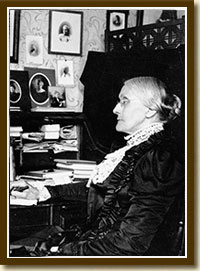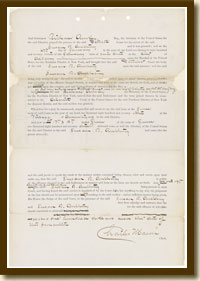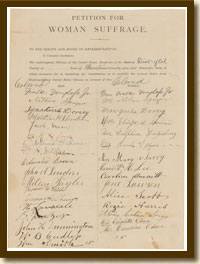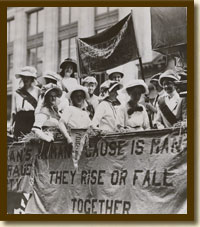Section III: This Land is Your Land

With an unprecedented wave of immigration occurring in the late 19th and early 20th century, the face of America changed. New immigrants and long-term residents struggled to assimilate as well as overcome social inequalities and injustices.
Photograph, Susan B. Anthony,
not dated
General Photographic File of the Women's Bureau
National Archives, Records of the Women's Bureau
Record Group 86
Susan B. Anthony devoted some 50 years of her life to the cause of woman suffrage. After her arrest for casting her ballot in an 1872 congressional election, she took full advantage of the high-profile nature of her case to promote her cause. Fourteen years after her death, women finally gained the vote with the passage of the 19th Amendment to the Constitution in 1920.
U.S. vs. Susan B. Anthony,
Record of Conviction, June 28, 1873 (facsimile)
Susan B. Anthony Criminal Case File, Criminal Cases Heard in the U.S. District Court for the Northern District of New York National Archives, Records of District Courts of the United States, Record Group 21 (ARC ID 278304)
Susan B. Anthony registered and voted in the election of 1872 in Rochester, New York. As planned, she was arrested for “knowingly, wrongfully and unlawfully vot[ing] for a representative to the Congress of the United States,” convicted by the State of New York, and fined $100.
Petition for Woman Suffrage, 1877 (facsimile)
National Archives, Records of the U.S. House of Representatives (HR 45A-H11.7)
One of many petitions that were circulated “to prohibit several States from Disfranchising United States Citizens on account of Sex.” This petition was signed by Frederick Douglass, Jr.
Photograph, Suffrage Parade, 1913
Photographs Used in Publications National Archives, Records of the Office of War Information, Record Group 208 (ARC ID 593561)
Beginning in the mid-19th century, several generations of woman suffrage supporters lectured, wrote, marched, lobbied, and practiced civil disobedience to achieve what many Americans considered a radical change in the Constitution. Suffragists used tactics, such as parades, silent vigils, and hunger strikes, to gain support.
![[I]n respect to political rights, ...there can be no reason in the world for denying to woman the elective franchise. --Frederick Douglass, 1848](/exhibits/documented-rights/exhibit/section3/images/douglass-quote-2.jpg)
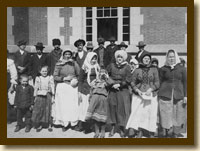
Photograph, Immigrants Outside a Building on Ellis Island, early 20th century
Public Health Service Historical Photograph File National Archives, Records of the Public Health Service, Record Group 90 (ARC ID 595650)
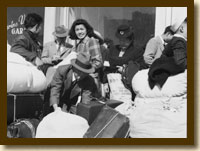
Japanese Evacuation from San Francisco, California, April 16, 1942
Central Photographic File of the War Relocation Authority National Archives, Records of the War Relocation Authority, Record Group 210 (ARC ID 536417)







